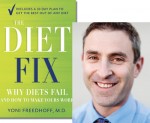Hands up if you like to eat!
Now hands up if the fact that you like to eat has made you want to throw the other half of the apple pie you just ingested across the room because IT WON’T LET YOU LOSE THE WEIGHT YOU ALWAYS WANTED TO LOSE!
Recently, as part of the Jewish Book Festival at the JCC, Dr. Yoni Freedhoff, known (maybe only by me) as Dr. Diet, presented about his new book The Diet Fix. The book details why more than 90% of diets fail, leaving people with frustration and/or apple pie all over their living room. (For a review of the book, see jewishindependent.ca/jewish-book-fest-in-a-week)
As someone who personally struggled with excess weight for most of his adult life – likely as a result of too much McDonald’s for most of his teenage life – before managing to kick it back to the drive-through a few years ago, I was intrigued to listen to and meet Dr. Diet to see what new concepts he could teach me. I wanted to see what he could tell me that, quite frankly, I hadn’t already learned from my dear friend Google.
While he didn’t get into the meat and potatoes (or cake and cookies) of dieting tricks, strategies and science, he did talk a lot about the psychology of dieting and how our society responds to it. More of a what-NOT-to-do presentation.
The good doctor presented what he called the seven deadly sins of dieting. Essentially, this is a list if misunderstandings or misdirections society has placed on the path to eating healthy and losing weight.
In no particular order (except for the one he presented them in), here they are for your consumption.
1. If you’re not hungry, you’re not losing weight. WRONG!
Starving yourself isn’t the key to weight loss, Freedhoff explained. As a matter of fact, he suggested that waiting until starvation kicks in before feeding yourself will more likely make bad cookies…I mean, choices (darn auto-correct!).
2. You must make sacrifices to lose weight. WRONG!
If you are constantly making sacrifices you aren’t likely to make this work on any long-term basis. It should be a choice of preference, not a sacrifice.
3. You need willpower to succeed. WRONG!
The reality is that we only have a limited supply of willpower. So if we are depending on that for success we are likely to fail at some point. Try having a long, hard, stressful day at work, then coming home looking for willpower in the crunchy, salty snack cupboard.
4. You should accept blind restrictions. DON’T DO IT!
A lot of people follow fad diets. They read that this new Garcinia Cambogiolawala plant can help you lose weight if you eat only that and a pickle for five days straight.
Despite my undying faith in pickles, if you don’t know why or how a diet will work, don’t do it!
5. You need to sweat it out. SO WRONG!
Reality weight loss shows like Biggest Loser preach that if you’re not pushing your self to barf-inducing levels you won’t succeed. On the contrary, Dr. Freedhoff said, if it’s not enjoyable, much like point #2 and #3, it’s not likely to last long.
As a point of perspective, he added that it takes running a full marathon to burn 1 pound of fat. Yet it takes only one hour sitting on your tuchus at the neighborhood pub to put it back on. The line, “You can’t outrun your fork” is one I will use again and again from now on.
6. You need perfection to succeed. WRONG AGAIN!
According to Dr. Freedhoff, people accept doing their best in just about every facet of their life except dieting. When someone is on a diet they believe they must be perfect in order to succeed. Obsession leads to unrealistic expectations. Once again, it won’t last. And you don’t need to call them cheat days. Maybe just try “living life days!”
7. We must calmly remain in denial. DENIED!
We avoid dealing with our true feelings about how we are struggling with our weight or eating habits. If we fool ourselves about what we really want to do or can do we are just denying ourselves the chance to find confidence in our abilities to succeed. The consequences of struggling are guilt, shame and despair. Which often leads to? Binging!
Bottom line: It seams that what the Diet Doctor is saying is that it’s more important to tackle our weight issues with our heads than it is with a program or a set of diet rules.
Set clear goals that you know you can work with long term and take them on one step at a time. Otherwise, well, we’ll see you again at the next diet meeting!

